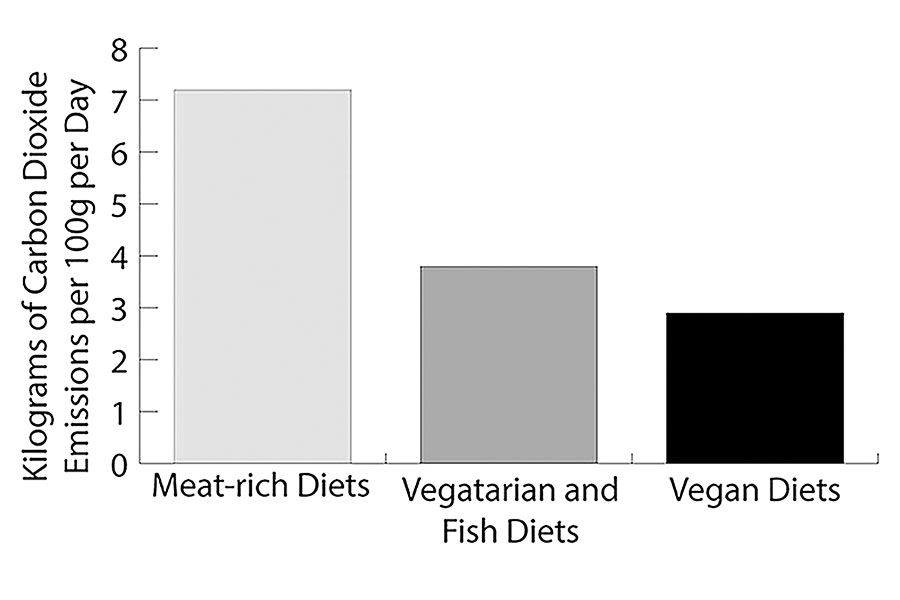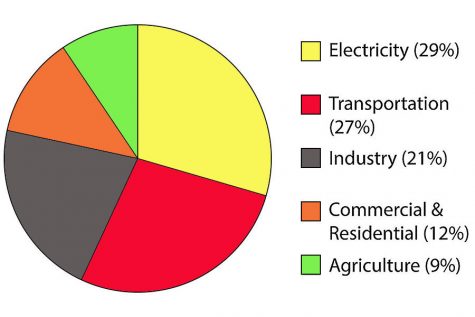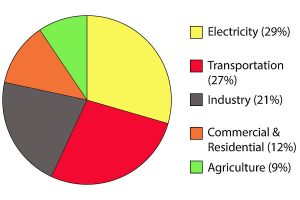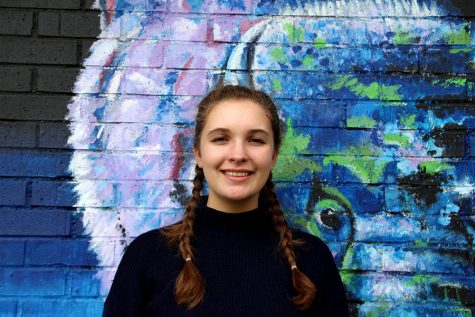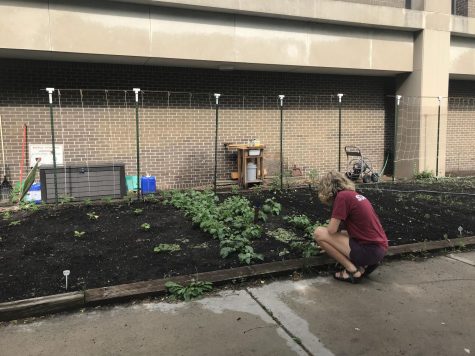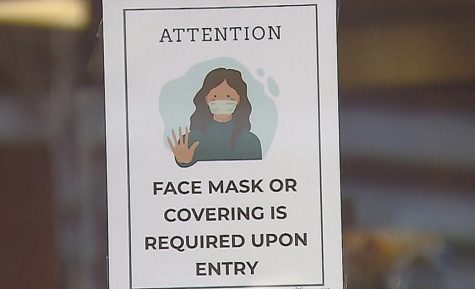Discussions of climate change must include the meat and dairy industries
In the graphic above, people who consume meat and other animal products leave a larger carbon footprint than those who don’t. Many people don’t know that on a global scale the livestock industry produces more greenhouse gas emissions than all forms of transportation combined. We need to include the animal industries in our discussions of climate change. Graphic: Eli Shimanski
June 5, 2017
For the past sixteen years I have grown up in a vegetarian household with an electric car and geothermal heating. I have always been acutely aware of climate change and how individual consumer actions can be a part of the solution. As I grew older and became more involved in the Climate Justice Movement I realized how little we talk about the meat and dairy industries in discussions of climate change. The animal industries are not the only issues we overlook. The industry of fast fashion is also harmful to the environment but often left out the conversation.
Many people are not aware of the huge impact these industries have on our CO2 emissions. One of the primary issues with eating meat is the vast amount of land required to raise the millions of animals, which results in deforestation. Raising meat also requires more water per calorie than raising plants. (It is important to note that the studies finding a plant-based diet worse for the environment have largely been debunked.)
Many students at South practice a vegetarian or vegan lifestyle. Sophomores Astrid Berger and Cali Juberian-McGuire have both been vegetarian for the past couple years. They both cite animal cruelty as a major reason for becoming vegetarian. “My primary motivation is respect for animals, and beings and bodies,” Berger said. Juberian-McGuire and Berger also mentioned the environmental impacts of the meat and animal product industries.
Switching to a completely vegetarian or vegan diet may not be for everybody. Additionally, an individual or even the entire world population deciding to cut out meat certainly won’t solve the issue of climate change. Although you may have many reasons for continuing to eat meat and dairy, your health shouldn’t be one of them. According to WebMD, the vegetarian diet is associated with lower rates of hypertension, cancer, and chronic diseases. Additionally, the University of Oxford estimated that $730 billion could be saved on healthcare on a global level by just cutting meat, egg and dairy levels down to the United Nations dietary guidelines.
Vegetarians and vegans may be at increased risk for certain nutritional deficiencies but it is generally a healthy diet. Family physician Dennis Dischinger said, “People [wanting to switch to a vegetarian diet] should understand that the health impacts are almost entirely positive… I would absolutely recommend that people consider it. I would say it’s not an all or nothing, it can be a gradual transition. Reducing meat consumption is a good way to start. And I think once you do that you’ll find that it’s not as difficult as you might think.” Dischinger has been a vegetarian for the past 25 years and has many reasons for this decision. “Probably the most prominent [reason] at the time I became a vegetarian was the inefficiency… We lived in Blue Earth county which had some of the richest farmland in the world but acre after acre of farmland was devoted to feeding animals, for their meat.” This is a reasonable concern, one Cornell study by Professor Pimentel found that that over half the grain in the U.S. is used to feed livestock. The same study found that all the grain fed to livestock could feed around 800 million people. Dischinger added that there were additional “ethical considerations” that influenced his decision.
Many people agree with reasoning behind a vegetarian diet but find other barriers such as cost or accessibility. However, following a vegan or vegetarian diet does not have to be expensive. A study from 2015 published in the Journal of Hunger and Environmental Nutrition found that a vegetarian diet can save $750 a year on food. There is also a very prevalent stereotype that vegan and vegetarianism is only for young, upper-middle class whites. This completely ignores the people of color and lower incomes who have followed vegetarian diets for generations and work to bring fresh, healthy foods to their communities.
A study done by Food and Agricultural economist and author, Jayson Lusk, found that people of color are more likely to be vegetarians (as are women). If we continue harmful stereotypes, we leave the many lower-income and people of color who are vegetarians or vegan out of the discussion, perpetuating exclusion.
I do want to recognize that committing to a fully vegan or vegetarian diet would be difficult for many people with specific health issues, who live in meat-eating households, and who have less access to a variety of food. However, even if we just reduce our animal product consumption by a small amount we can still make a huge difference. I wouldn’t expect people to stop driving cars or never use electricity but similarly to our gas and fuel consumption, the food we eat is something we should be aware of. Avoiding meats (such as beef) that produce large amounts of carbon is a great place to start. As Sophomore Marie Stebbings said, “Maybe just try it out or try it three days a week and you can have a huge impact on the environment.”

